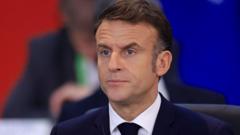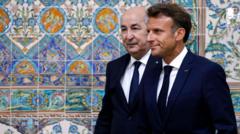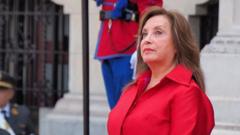**The French government, led by Prime Minister François Bayrou, successfully navigated a no-confidence motion, ensuring the continuation of governance despite ongoing political challenges.**
**French Government Secures Stability After Defeating No-Confidence Vote**

**French Government Secures Stability After Defeating No-Confidence Vote**
**Vote Allows for Passage of 2025 Budget, Temporarily Easing Political Tensions**
The French government experienced a shallow victory on Wednesday when it defeated a no-confidence vote in Parliament, allowing Prime Minister François Bayrou a short respite from the persistent political instability that has gripped the nation in recent months. The motion garnered the backing of only 128 of the 577 members of the National Assembly, falling short of the majority needed to oust Bayrou and his administration.
This outcome paves the way for the endorsement of the 2025 budget, critical for France as the government has been relying on temporary funding since the year's outset. The budget aims to address the nation’s escalating debt and deficit, with plans to save 50 billion euros through both tax hikes and expenditure cuts. Following this pivotal vote, the budget will proceed to the Senate for its final consideration on Thursday.
Despite a successful no-confidence vote, Bayrou faces considerable challenges ahead. The lower house of Parliament remains starkly divided, featuring a coalition of centrist-conservative legislators backing Bayrou and two significant opposition groups: the left-leaning New Popular Front alliance and the nationalist National Rally party. This fragmentation of the political landscape indicates that while the immediate threat to Bayrou's government has been mitigated, the underlying instability remains a pressing issue.
Bayrou, who has been in office for just over a month, is the fourth prime minister appointed in a year, highlighting the turbulence within French politics. The government's focus now shifts to other legislative initiatives, including those addressing healthcare and social security, with the potential for further no-confidence motions looming over the administration. Nevertheless, the approval of the budget signifies a temporary stabilizing force for one of Europe’s major economies during these uncertain times.
This outcome paves the way for the endorsement of the 2025 budget, critical for France as the government has been relying on temporary funding since the year's outset. The budget aims to address the nation’s escalating debt and deficit, with plans to save 50 billion euros through both tax hikes and expenditure cuts. Following this pivotal vote, the budget will proceed to the Senate for its final consideration on Thursday.
Despite a successful no-confidence vote, Bayrou faces considerable challenges ahead. The lower house of Parliament remains starkly divided, featuring a coalition of centrist-conservative legislators backing Bayrou and two significant opposition groups: the left-leaning New Popular Front alliance and the nationalist National Rally party. This fragmentation of the political landscape indicates that while the immediate threat to Bayrou's government has been mitigated, the underlying instability remains a pressing issue.
Bayrou, who has been in office for just over a month, is the fourth prime minister appointed in a year, highlighting the turbulence within French politics. The government's focus now shifts to other legislative initiatives, including those addressing healthcare and social security, with the potential for further no-confidence motions looming over the administration. Nevertheless, the approval of the budget signifies a temporary stabilizing force for one of Europe’s major economies during these uncertain times.




















